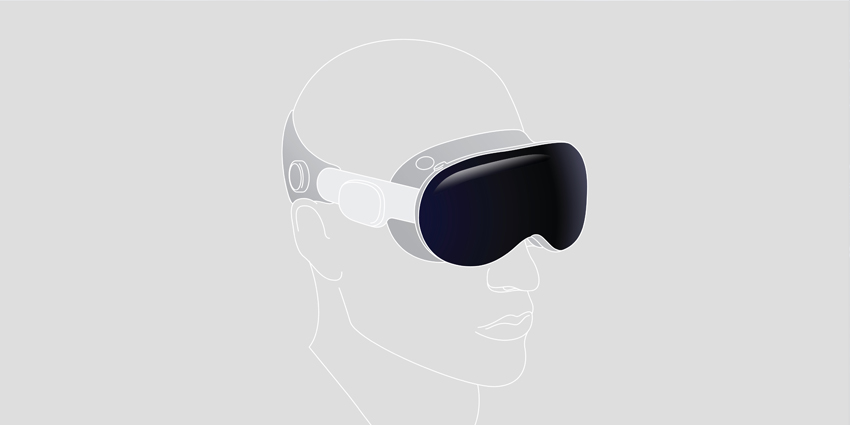The Apple Vision Pro comes priced at $3,500, a big accessibility hurdle for many. The high cost could price many out of the product. While enthusiasts pick the device up at will, broader audiences may want an affordable alternative or cheaper future Vision Pro iteration.
The device comes with top-tier specs to justify its price, such as 256GB/512GB/1TB storage, 23 million pixel display, 90Hz/96Hz/100Hz refresh rate, spatial audio, 2 hours of battery, Bluetooth, eye tracking, hand tracking, and a 21.2-22.9 ounces weight.
The device’s specs are inviting; however, based on price and a lack of worldwide availability, many cannot leverage the device – yet. So, XR Today compiled a list of currently available and upcoming MR headsets and AR smartglasses that are affordable entries into the spatial computing market.
XREAL Air 2 Ultra
XREAL’s latest Air 2 Ultra AR smartglasses achieve a similar outcome to the upcoming Vision Pro but at a far lower price of $699. Moreover, unlike Vision Pro, XREAL’s product will be available worldwide in March.
The device runs on a Qualcomm chipset and leverages a custom OS to enable spatial computing experiences with hand tracking. Like the Vision Pro, the XREAL Air 2 Ultra allows users to interact with applications spatially anchored in a real-world environment.
While the XREAL Air 2 Ultra focuses on entertainment applications, XREAL is also moving towards productivity applications with a product partnership with Sightful to create an AR laptop.
Recently, XREAL secured a funding round of $60 million in a strategic round to launch the firm as a competitor to the Apple Vision Pro, boosting the firm’s overall funding to roughly $300 million,
Chi Xu, CEO and Co-founder of XREAL, stated that the latest strategic fundraising round reinforces the firm’s position in the global AR market and “skyrocket[s]” XREAL expansion goals while also “demonstrating strong commitment from our trusted fundraising partners.”
HTC VIVE Flow
The HTC VIVE Flow headset costs $499. It promises to provide users with a comfortable, lightweight, and portable MR experience, an affordable option for businesses with smaller budgets or teams looking to share a simple XR device.
VIVE has upgraded Flow’s software over the years since its release to deliver better tracking capabilities and immersion. The device is compatible with Android and iOS phones, has a lightweight/foldable form factor, 64GB ROM/4GB RAM storage/memory, 189 grams weight, and has a resolution of 3200×1600 pixels combined.
The immersive smart glasses are present in healthcare settings to improve patient care and training procedures via partners XRHealth. Moreover, the product has a deep digital storefront filled with various XR applications.
Solos AirGo 3
The Solos AirGo 3 is one of the most exciting new smart glasses in the immersive marketplace, costing roughly $249
Solos is bringing the AI into its specs. The “Argon” lineup is the most expensive, but all versions have an IP67 waterproof rating and a 7-10 hour battery life.
Some of the key features of these glasses include USB charging that provides a battery life of 7-10 hours, virtual buttons to connect with your phone, splashproof IP67 design, touch sensor controls for adjusting volume, modular frame options, Bluetooth connectivity, and AI integration powered by ChatGPT. Additionally, the glasses are equipped with beamforming microphones.
Meta Quest 3
The Meta Quest lineup is a reliable option for any XR device customer, with options for consumers and businesses via an enterprise program.
The Quest 3 offers significant improvements over its predecessors, such as a higher pixel quality display, 40% louder sound, and Qualcomm’s latest Snapdragon XR2 Gen 2 chipset.
The Quest 3 allows users to leverage mixed reality applications, similar to the Vision Pro, to provide a full-colour passthrough with minimal distortion.
The base model with 128GB of storage is priced at $399, while the 512GB version is priced at $649, with additional bundles available for purchase. For instance, the comfort bundle includes an advanced head strap, while the Power bundle comes with an elite strap and an extra battery.
Meta and its Reality Labs immersive solutions R&D division are storied in creating industry-leading specs, and the Meta Quest 3 includes:
- Display: LCD 2064 x 2208 pixels per eye.
- Processor: Snapdragon XR2 Gen 2
- RAM: 8GB
- Storage: 128GB and 512GB
- Battery life: 2-3 hours (with an extra 2 hours with the elite powered strap)
- Field of view: 110 x 96
- Mixed reality: Full-color passthrough
- Tracking: Inside-out tracking (full-body tracking to come later)
RayBan Smartglasses
A limited yet affordable entry into spatial computing is the Meta-led Ray Ban smartglasses partnership, a second iteration of the firms’ smartglasses product that entered the market last year, and the firms redesigned the product from the ground up. This allows the team to improve core functionality and add brand-new features significantly.
The Ray-Ban Meta smart glasses are affordable for those interested in augmented reality. Starting at $299, they come with stylish eyewear, an integrated camera, and open-ear headphones. Although they don’t offer comprehensive AR or mixed reality features, they allow you to capture video and communicate while moving.
The basic specifications of the glasses include a 12MP ultra-wide portrait camera, 1080px video resolution, live streaming mode for up to 30 minutes, 32GB of storage for videos and photos, 133-gram weight, custom-built speakers, five mics with immersive audio recording, Bluetooth 5.2 and Wi-Fi 6 connectivity, IPX4 water resistance, and 36 hours of battery life (with the case).
Immersed Visor
Finally, an upcoming headset from XR start-up Immersed will be a wildcard in the XR device race. The firm’s Visor device comes at a starting price of $499, far lower than competing device prices – offering an incredibly similar spatial computing experience to the Vision Pro.
The XR Visor has several features to provide a secure and immersive productivity environment, including powerful outward-facing cameras for HD colour passthrough, 2.5K or 4K micro OLED per eye (depending on the model), hand and eye tracking support, 6 degrees of freedom, 100° Field of view, ultra-widescreen support, and a modular mount for custom IPD.
The device is available in three models: the 2.5k model for $499.99, the 4K model for $749.99, and the 4K “Founders Edition” for $999.99. The Founders Edition includes a lifetime subscription to Immersed’s premium tier and invitations to early access Visor demos at Immersed HQ. Moreover, the Founders Edition ships six months before the standard Visor 4K product.







